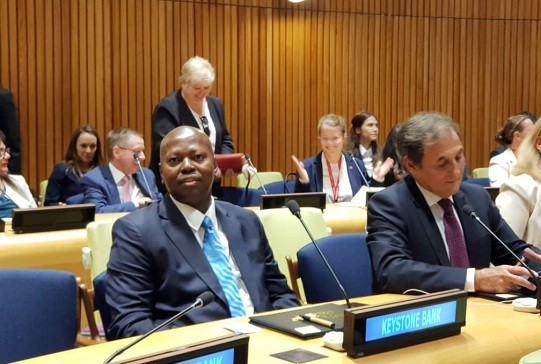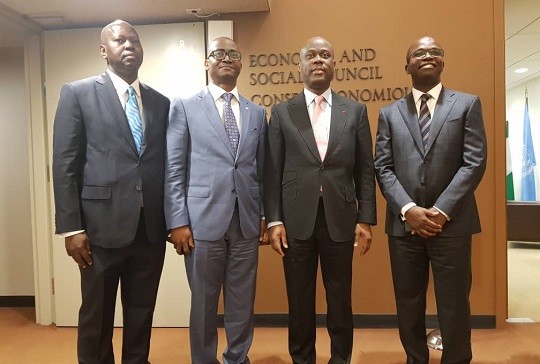OUR PHILOSOPHY AND COMMITMENT
As a financial service provider with an obligation to comply with international best practices, Keystone Bank Limited has continued to ensure that its business operations and activities comply with applicable national environmental and social regulations.
In line with our business strategy in adopting sustainability principles, our operation is anchored on providing financial services in a responsible manner that is consistent with global sustainable practices without compromising shareholders’ value whilst impacting positively on the lives of our employees, customers and host communities.
Our commitment to exceptional service extends beyond providing traditional banking services. It includes giving back to the communities in which we operate to make a lasting difference through our four main Corporate Social Responsibility pillars: Health, Education, Women & Youth Empowerment and Employee Volunteer Scheme not neglecting the environment in which we operate.
Demonstrating our commitment to Corporate Social Responsibility is a deliberate strategy for Keystone Bank that aligns our business values, purpose and trust with the social and economic needs of stakeholders, whilst entrenching responsible and ethical business policies and practices in all our activities.
View our sustainability Report
- Youth & Women Empowerment
- Health Initiative
- Education Scheme
- Employee Volunteer Scheme
- Environment
- Financial Inclusion
- Responsible Banking Principles
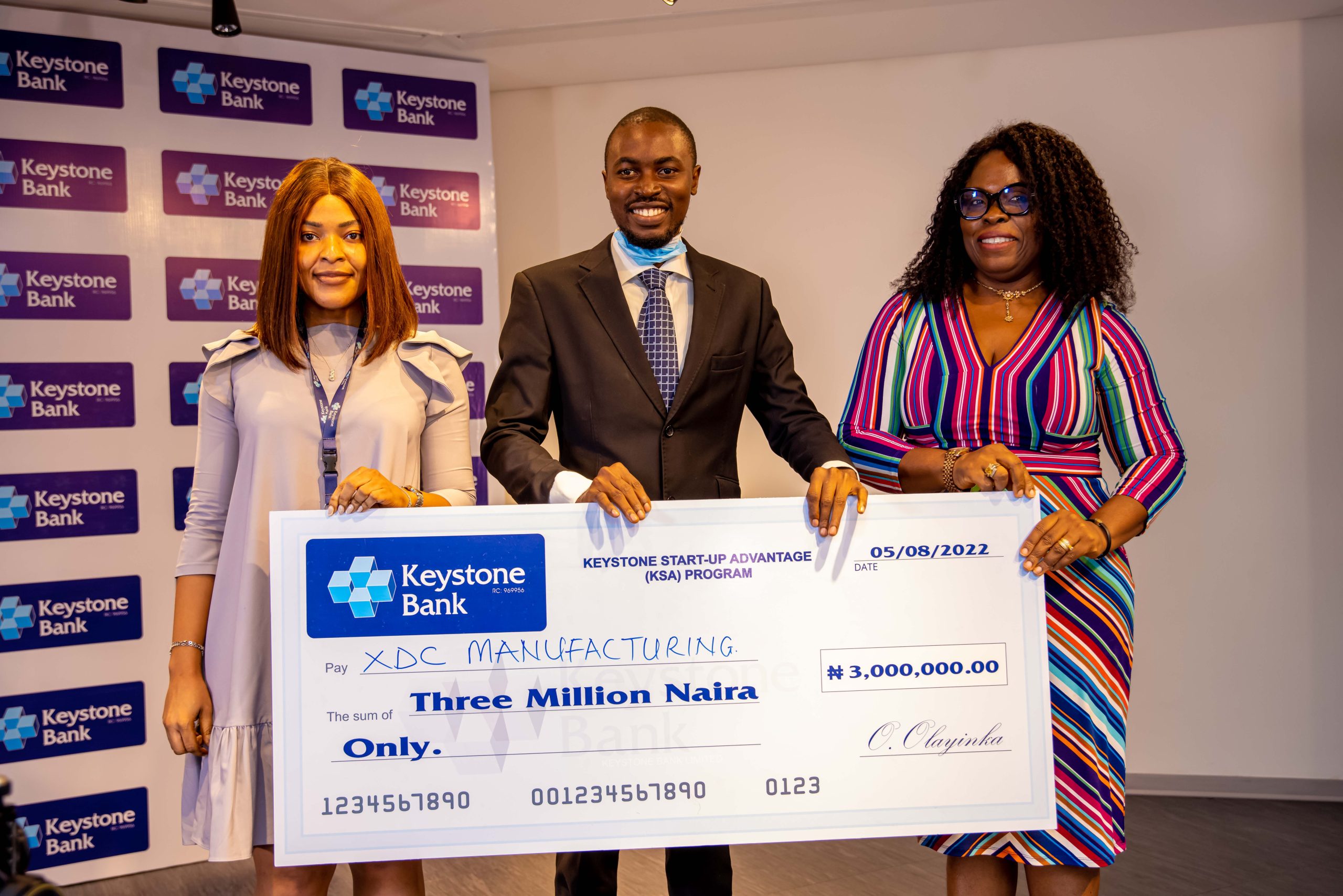
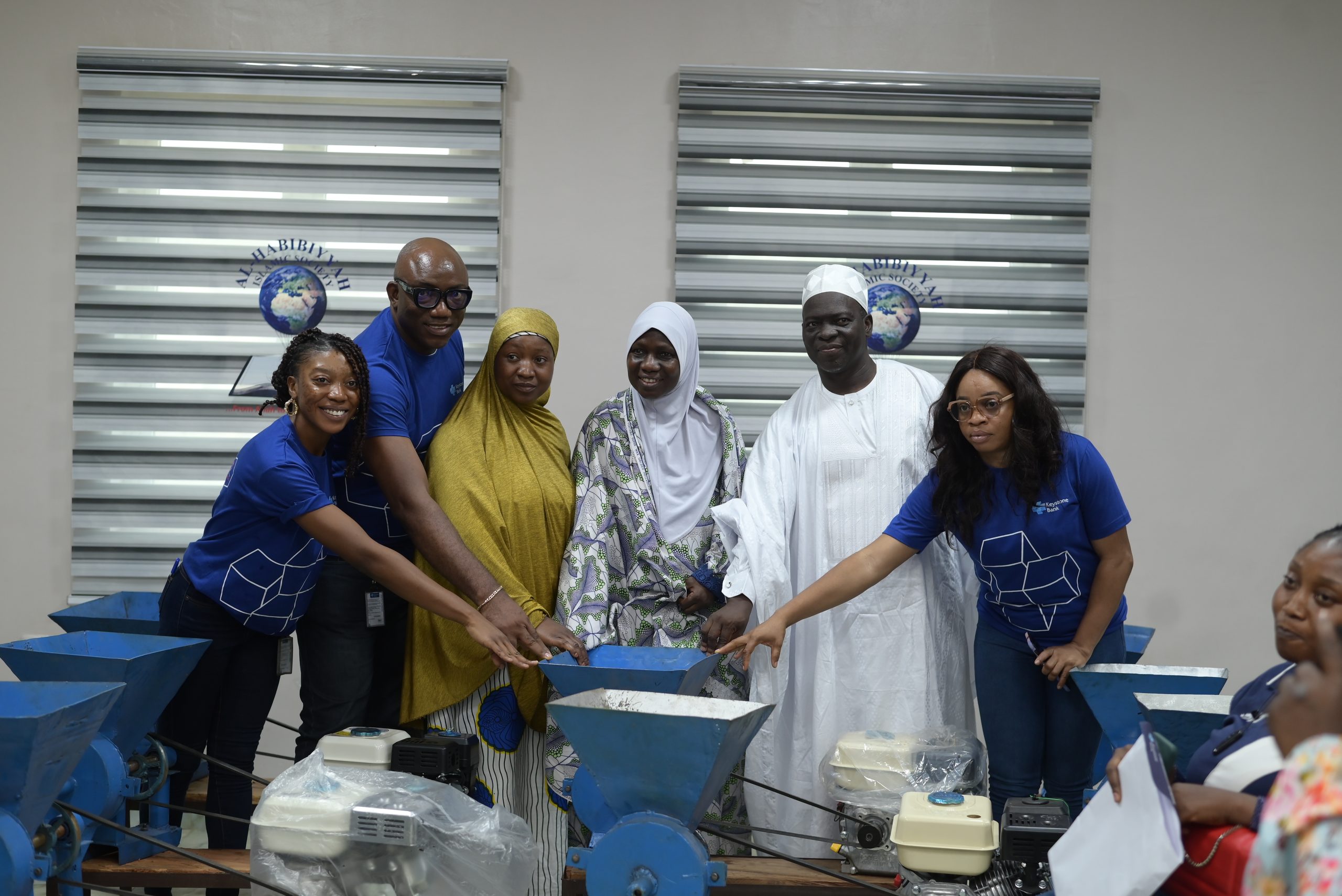
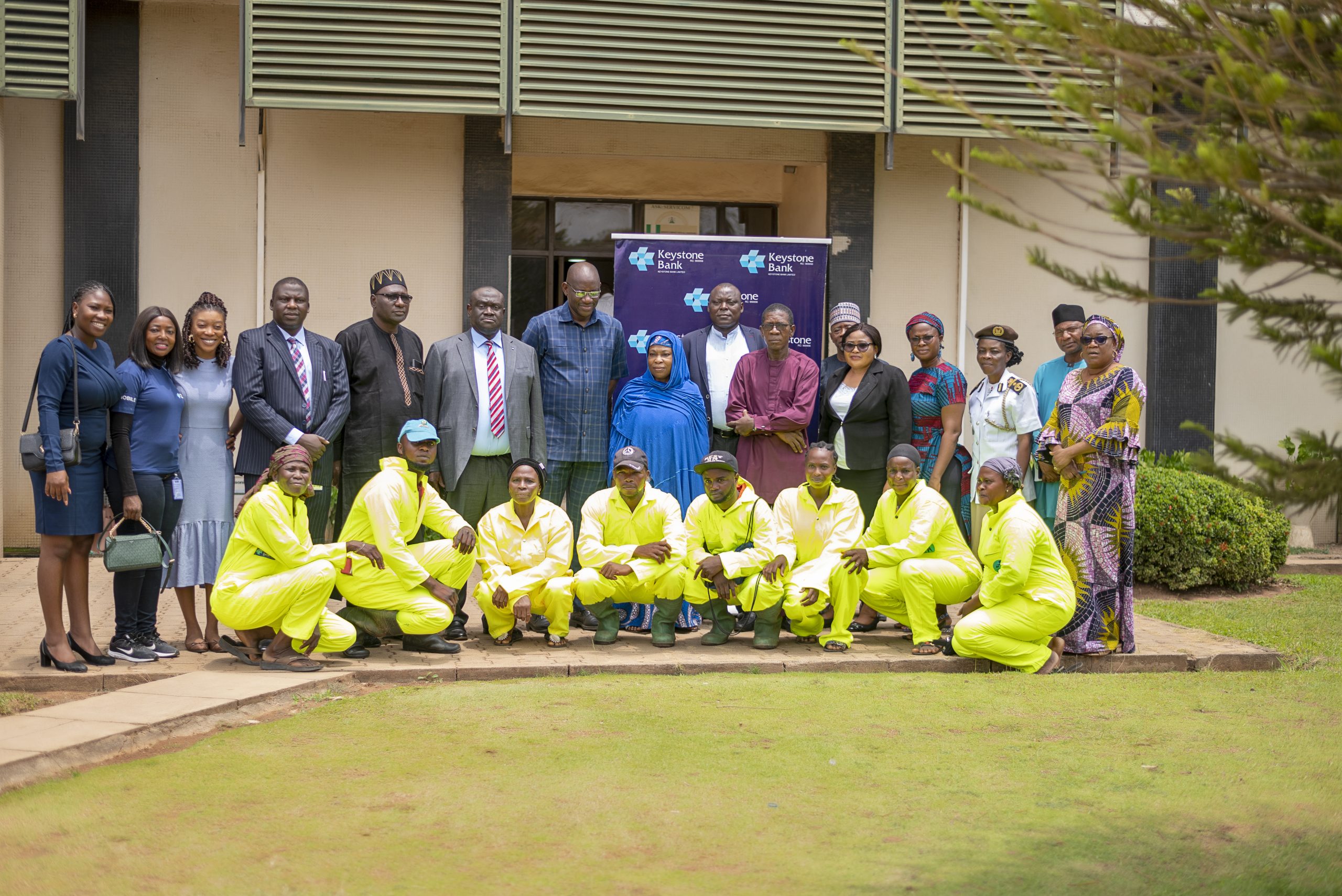
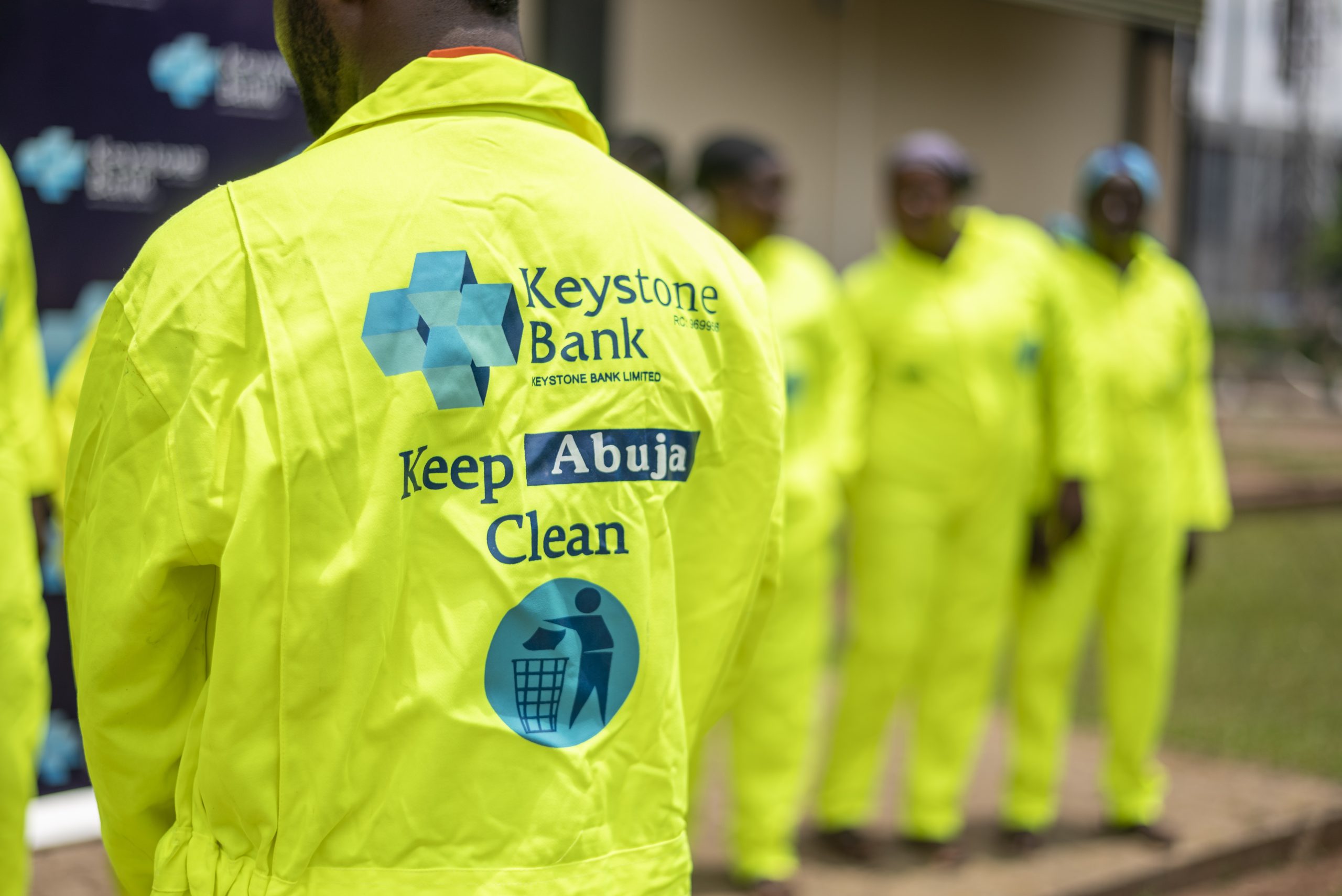
Keystone Bank Empowers Underprivileged Women through It’s EVS Initiative
Keystone Bank Nigeria, a leading financial institution renowned for its commitment to social responsibility, has recently undertaken a remarkable initiative aimed at uplifting underprivileged women in Abuja, Asaba in Delta State, Port Harcourt in Rivers State, and Calabar. The bank has provided these women with commercial grinding machines, enabling them to start their own businesses and pave their way to financial independence. In a series of heartwarming ceremonies held across the four locations, Keystone Bank’s Head of Retail, Mr. Anayo Nwosu, presented the commercial grinding machines to the beneficiaries. The events were attended by community members, local leaders, and representatives from Keystone Bank, demonstrating the bank’s unwavering dedication to its host communities in Nigeria.
By investing in the empowerment of underprivileged women, the bank is actively working towards eradicating poverty and promoting gender equality in Nigeria. The grinding machines provided by Keystone Bank will not only enhance the entrepreneurial opportunities for these women but also enable them to become self-sufficient and financially stable. As they embark on their entrepreneurial journeys, the bank will continue to provide guidance and support, ensuring their long-term success.
Through this initiative, Keystone Bank demonstrates its unwavering dedication to making a positive impact on the lives of Nigerians, particularly the underprivileged. By empowering women and nurturing entrepreneurship, the bank sets an example for other organizations to follow, fostering sustainable growth and development within Nigeria’s host communities. As Keystone Bank continues its mission to build with its host communities, initiatives like these serve as a testament to its commitment to social responsibility and sustainable development. By empowering underprivileged women with commercial grinding machines, the bank is not only changing lives but also contributing to the prosperity of Nigeria as a whole.
Keystone Bank donates protective garments to AEPB
In furtherance of its pursuit to environmental sustainability, Keystone Bank Limited, one of Nigeria’s leading deposit money banks, recently donated protective garments to the Federal Capital Territory Administration (FCTA). Presenting the items to the Abuja Environmental Protection Board (AEPB) for distribution among its highway sweepers and workers in the FCT, the bank’s head of Public Sector Group, Suleiman Mohammed, said the burden of keeping a clean environment cannot be left to state governments alone. Mohammed explained that the protective garments would be used by the waste management personnel of the AEPB to protect themselves from dangers, particularly motorists, while cleaning the capital city.
According to him: “As part of Keystone Bank’s Corporate Social Responsibility (CSR), we present these protective garments to support the government’s environmental sanitation efforts. As a bank, we believe seriously that if we neglect the environment, we are all going to suffer for it. The starting point is supporting those who are directly and actively participating in taking care of the environment. These are the people we see every day and night, under the sun and in the rain keeping our environment clean and safe.”
“Therefore, providing them with a protective garment will go a long way in protecting and motivating them to work in a safe and encouraging manner. We don’t want them to be exposed to unnecessary dangers that could be averted by simply providing such garments. We are always willing to partner with states and other organizations that are committed to keeping the environment clean and safe.” AEPB director, Engr. Osilamah Braimah, in his comments, expressed his gratitude to the bank for the gesture. He emphasized that this was the first time a bank would make such a donation to the board, stressing that the gesture would help to improve the productivity of its personnel.
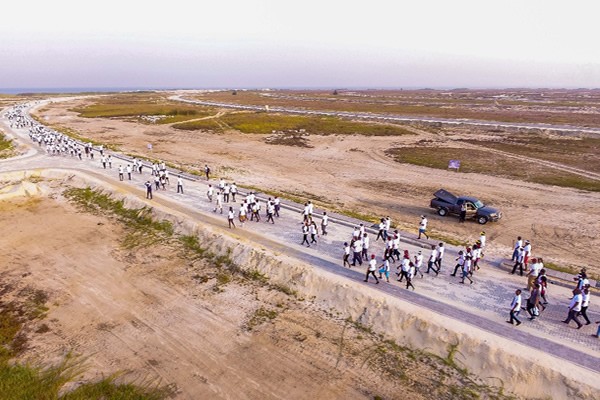


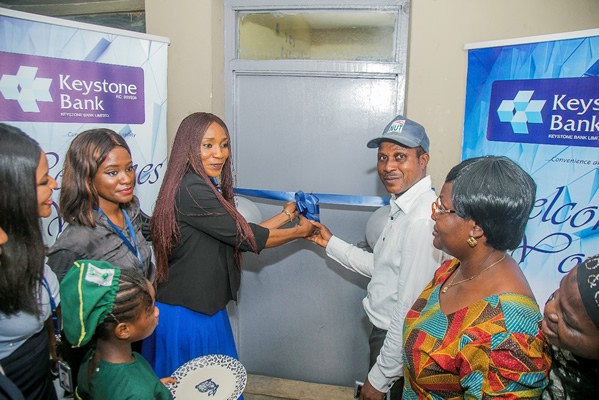
KEYSTONE BANK LEADS OVER 600 IN HEALTH WALKATHON
In demonstration of our commitment to promoting fitness and healthy living amongst Nigerians, Keystone Bank flagged off 2019 with the Orange Island/Keystone Walk themed ‘Invest in your Health’. The event was in collaboration with the Orange Island Development Company.
The bank recognises the importance of health and well-being to economic development, leading over 600 participants to cover a distance of 5km around the island. Apart from the walk there were warm up sessions by popular OAP Kaylah Oniwo and celebrity fitness coach Maje. We strive to continually promote advanced healthcare in Nigeria.
KEYSTONE BANK RENOVATES SICK BAY AT DODAN BARRACKS PRIMARY SCHOOL, LAGOS
Keystone Bank recognises education as the bedrock of sustainable development, accelerating progress and positive change in the society at large. Education is one of our core CSR pillars, as we strive to impact the leaders of tomorrow.
In keeping with the Bank’s commitment to promote qualitative education and advanced healthcare in Nigeria, Keystone Bank Limited has handed over a renovated and fully equipped Sick Bay to Dodan Barracks Primary School, Obalende, Lagos to provide adequate healthcare for its pupils.
This intervention is aimed at improving the learning and teaching environment in schools, thereby raising the standard of education and healthcare in places where they are most needed in the country.
THINK ROAD SAFETY, SAVE LIVES
At Keystone Bank, we believe health is an integral aspect of the country's economic development. The Keystone Bank CSR health initiative tagged, "Think Road Safety, Save Lives" launched on November 21, 2013 to provide health screening and teach preventive health measures to road transport workers. This is in line with the FRSC projection to reduce road traffic accidents by 50% by 2015 and mitigate the 90% of road accidents attributed to human factor. Similarly, it aligns with the United Nations General Assembly resolution of 2010 calling for a Decade of Action for Road Safety from 2011 to 2020.
Major partners of this project include The Eye Foundation Hospital, Public Health Partner and Federal Road Safety Commission (FRSC) with the amiable comedian, Saka, appointed as the project ambassador for this initiative.
Keystone Bank identified that interstate drivers accounted for majority of the mass transportation in Nigeria. Thus, the Bank set out to educate drivers and refocus their perceptions about their health with regular health checks to promote a safer society.
The CSR event was divided into three action-packed days, beginning with an interactive road show on November 20, 2013 to communicate to commercial drivers the importance of eye screening tests and relay the benefits of the Keystone Bank project. The launch of the CSR event was held at Transcorp Hilton, Abuja on November 21, 2013 with the aim of promoting a “health-check culture” among commercial bus drivers in Nigeria. Screening of drivers also commenced that day at Jabi Motor Park involving: testing and identifying their visual acuity; verifying the accuracy of the blood group listed on their driver’s license; providing corrective glasses; and offering health screenings (body mass index, blood pressure readings, fasting/random blood sugar levels and blood lipid profile levels). The last day of the event witnessed screening at Edegbe Park Line on November 22, 2013. In total, the Bank and its partners screened over 200 mini and luxurious bus drivers. After receiving positive responses and results from the Abuja event, the Bank continued the Health and Eye Screening project in motor parks in Lagos and Port Harcourt in 2014 with plans to extend the health and eye screening tests in all 6 geo-political zones from 2015.
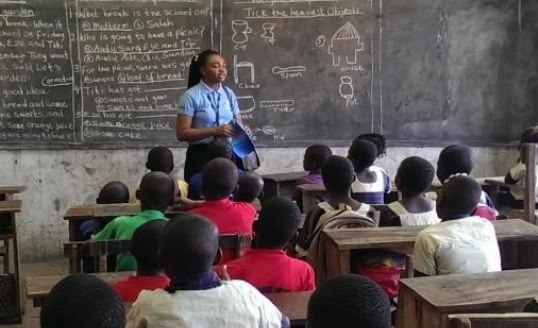
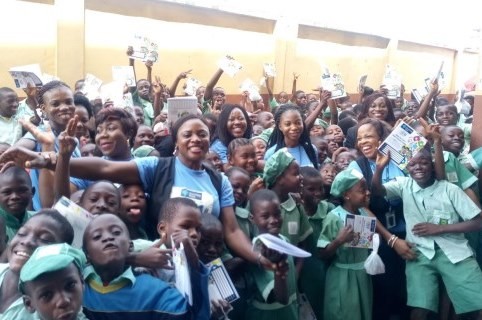
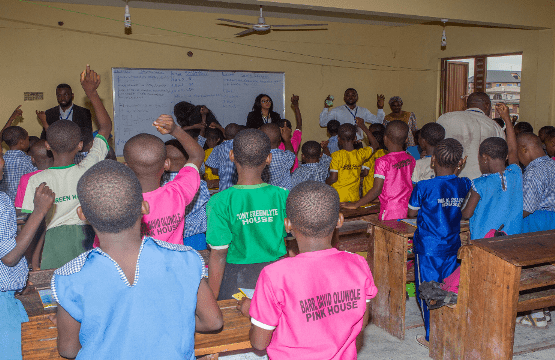
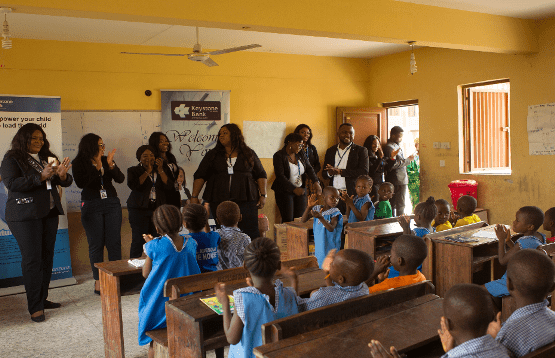
We acknowledge education as an essential aspect of the development of any society, and advocate providing easy access to first-level healthcare in schools.
The importance of knowledge and learning has been recognized since the beginning of time. Plato wrote: “If a man neglects education, he walks lame to the end of his life.” Achieving primary education is listed as one of the millennium development goals by the United Nation following the global state of educational system in most countries. Although Government bodies continue to strive in meeting the educational demands of its citizens, a huge gap still stands out in this sector which needs to be urgently bridged to achieve significant socioeconomic development. Keystone Bank shares a similar vision for national and economic development, hence we are consistently devising initiatives and seeking out various opportunities for collaboration with the government to enhance the educational output of the communities wherein we operate. In 2018 the bank embarked on an educational campaign tagged “the future today” in public primary and secondary schools across the federation. The campaign focused on the following:
• Financial Literacy
• Provision of Educational materials for enhanced learning
• Mentorship and life coaching
• Educational debate
Through this campaign thirty schools were impacted with a reach of over five thousand students.
NATIONAL SCHOLARS SCHEME
Keystone Bank National Scholars Scheme Background
The Keystone Bank National Scholars Scheme focuses on the proactive orientation and training of the next generation to create constructive change in the society.
We partner with accomplished role models, who embody requisite values, from all walks of life to speak with young audiences to propagate and evaluate positive choices.
Target Audience: The primary target audience is secondary school level youth who possess impressionable minds, with expected trickle-down effects on parents and the larger community.
Structure: Branches take on and mentor students in schools closest to them.
Duration: This is a lifetime project.
The Programme
The programme has three facets:
* Motivational Series
* Mind Development
* Mentoring Scheme
The Motivational Series
The motivational series engage accomplished national figures who model positive values to spark productive ambition in the youth.
These sessions are held in their natural environments – schools, neighbourhoods and youth groups – where inspirational experiences are shared and questions are sincerely treated to drive positive change in the lives of numerous Nigerian youth.
Mind Development
We have extended our school footprint to build the requisite knowledge and intellectual capabilities of our scheme beneficiaries through our interventions with libraries.
This is the second facet of the Keystone Bank National Scholars scheme. From building comfortable libraries to stocking up new books, Keystone Bank National Scholars Scheme will continuously seek to shape the minds of the new generation.
The Mentoring Scheme
We understand the challenges indigent youth face with accessing role models in their community beyond motivational sessions. The mentoring programme utilizes the twin approaches of inspiration and practical provision, encouraging willing staff members to mentor students within their immediate localities. A broad range of mentoring activities including discussions, counseling, teaching, picnics, book gifts, industrial visits, etc. are executed to change students’ lives for the better.
Implementation
The Scheme was officially launched on Wednesday, February 11, 2004 with 100 indigent students in five public schools - Eko Akete Grammar School, Victoria Island Secondary School, Government College Maroko, Ikeja High School and Agboju Secondary School as beneficiaries. The Bank pays all levies and exam fees for these students, provides them with uniforms, sandals and school bags, in addition to monthly stipends to ensure that they are not distracted from academic pursuit due to unavailable finances. Modern libraries, each with a seating capacity of over seventy students, have been re-constructed under the Mind Development series in each of the five schools benefiting from the pilot scheme. In addition to stocking the libraries with books on key subjects, books for all subject areas have been purchased and distributed to benefiting students.
The choice of public schools is a direct response to their parlous state and will reinvigorate a reading culture.
Testimonial
For many students, tertiary education is a tall dream. Keystone Bank National Scholars Scheme equalizes opportunity for those who would otherwise be excluded. Indeed, two years into full implementation of the Keystone Bank National Scholars Scheme, it is already impacting positively on the lives of the beneficiaries.
For instance, Issa Wasiu recently gained admission into University of Ilorin. When the scheme was launched in 2004, Issa, the Head Boy of Agboju Secondary School was in SS 3, final year. Born of an indigent carpenter father, Issa had no textbooks to read in preparation for the Senior Secondary School Certificate Examination (SSCE) and could not afford the N5,000 NECO fees.
Keystone Bank came to his rescue, donating books and covering the exam fees. Of the nine subjects enrolled for in the SSCE, he recorded distinctions in Mathematics, Agricultural Science, Biology, Chemistry, Physics, and Yoruba language and credit passes in the others. He exceeded the JAMB cut-off and now studies Engineering at University of Ilorin, on a five-year scholarship, sponsored by Keystone Bank National Scholars Scheme.
Keystone Bank is setting the pace for CSR efforts across organisations and is becoming the model of innovative commitment to our common good.
ICT CENTRE PROJECTS
In a bid to eliminate computer illiteracy and create an opportunity for pupils to better compete in the constantly changing technological landscape, Keystone Bank invests in ICT centres for students.
Keystone Bank partnered with the Inoyo Toro Foundation (ITF), an NGO; leading education foundation in Nigeria: Headstart IT, a Curriculum Developer with the NCC of Britain; and other project partners to expand the National Scholars and National Library Schemes to include ICT Centres, with the aim of progressively educating pupils on IT over the next 5 years.
The pilot programme, inaugurated in partnership with the Akwa Ibom State Government covered four schools with Keystone Bank Libraries namely: Cornelia Connelly College, Afagha Oku; Independence High School, Ikot Ntuen; Methodist Boys High School, Oron and Salvation Army Secondary School, Akai Ubium. Each school was provided with 30 computers, internet service, generators and recommended NCC Curriculum for over 1,000 pupils in Akwa Ibom State.
SCHOOL LIBRARY PROJECTS
Keystone Bank designed the National Schools Library Scheme to catalyze positive change and revive a reading culture through the donation of fully stocked libraries for students. The contribution of the best educational tools aims to boost innovation, flexibility and responsiveness in beneficiaries. Some of the benefits of the National Schools Library Project include:
1. Construction of School Library
2. Stocking of the library with textbooks in line with the National/State Curriculum.
3. Advocacy and community engagement for support of the project initiatives.
4. Award of scholarships to students in the schools based on set criteria.
5. Sponsorship of capacity building initiatives including seminars, excursions and training.
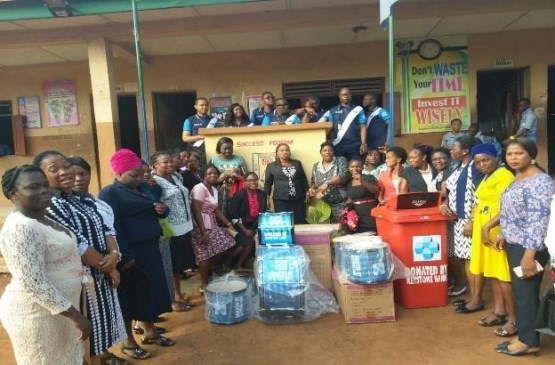
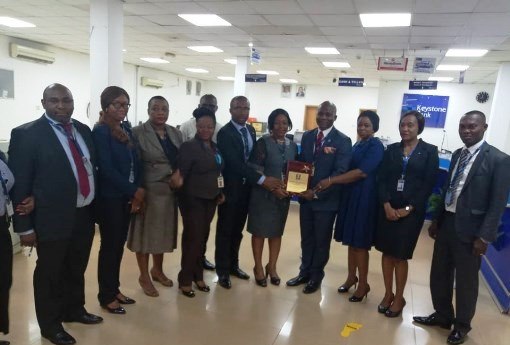
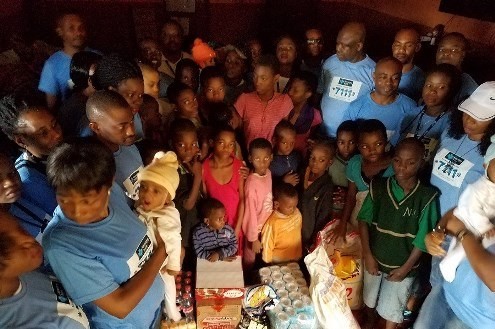
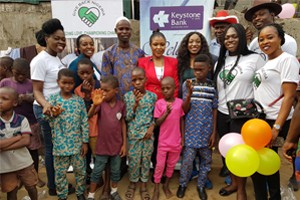
The role of employee volunteering will continue to remain critical for businesses to achieve success and a competitive advantage. As a Bank we have moved beyond the norm of cash-only contributions towards innovative solutions to engaging our employees to give back and serve in the communities where they operate. This is one out of the many strategies the Bank is utilizing to think outside the paradigm of community relations and involvement. These are some of the ways our employees volunteer within the scheme:
Team Challenges:
Every quarter business unit and branches are given a theme as a guide to creatively execute community impact project, winners are given awards to encourage healthy competition.
Individual Volunteering:
Employees are able to give regular time, about one or two hours per week or month. Activities include mentoring, sports administration, catering for the elderly and orphans.
Skills Based Volunteering:
Employees deploy their skills voluntarily for business support including financial or legal services, business planning, marketing or IT support.
Fundraising
Help to raise funds for voluntary organizations.
In Kind support
Providing a free service to a voluntary organization including use of facilities for meetings, limited agreed use of computers or photocopiers. This approach complements business goals and value as it builds the morale of our work force. It creates an enabling environment for team building and leadership activities and opportunities. More importantly help to alleviate community development challenges as our employee inspired initiatives are mutually beneficial.
CHEERFUL GIVING PROJECT
At Keystone Bank, we believe in sharing and showing kindness to everyone around us. This inspired our Cheerful Giving Project, tailored to each season of the year. This is one of the avenues to ensure our employees contribute positively to the communities around us by pooling resources together to make charitable donations to selected homes and institutions.
The theme of Christmas 2017 was tagged ‘Act of Kindness’. We shared the holiday spirit by visiting a few selected homes and meeting some of their identified needs.
Volunteers in Lagos participated in the Pacelli School for the Blind ‘End of Year Party’. They also collaborated with Give Back Nigeria to celebrate the yuletide season with the children and mothers of Makoko community, Lagos.
In Edo state, the volunteers spent a day in the Edo State Welfare Orphanage.
As a Bank of best practice, guided by sustainability in all that we do, we have taken on a conscious mandate to ensure our Cheerful Giving Project is impactful in the environment in which the bank operates.
PEOPLE MAKE OUR WORLD
Welcome to our world: a world where you are free to be you, where dreams and achievements connect, and belief and action meet.
Our commitment to People: Shareholders, Customers/Partners, Employees and their families as well as our larger community are unified on the platform of our first Social Report.
At the core of our values and actions as a socially responsible and visionary corporate citizen is the individual: the man on the street, the student in some remote college, the staff in the next office, or the dedicated public servant providing valuable service to the populace.
Our corporate social responsibility strategy revolves around multiple bottom lines – profit, people and environment – to positively impact the communities in which we live and operate.
Our social engagement involves a thorough process of needs articulation, stakeholder consultations and capital investment (both human and material) to foster development. Matching our belief with action, we have consistently identified, nurtured and celebrated excellence in different spheres within the community.
This universal thread runs across our corporate social responsibility initiatives and organization and is highlighted in our trailblazing Social Report.
It is our belief, as evidenced in the growing number of institutions who have caught the vision of social development, within and beyond banking, that in pioneering these efforts, others will be encouraged to join us to build the society of our dreams: where you are free to be you.
This first Social Report is part of our culture of transparency, and recognition of the value of effective two-way communication engendering stakeholder feedback and ultimately sustainable development. The Report is produced in line with Global Reporting Initiative (GRI) standards, and makes for a pleasurable read.
To receive a copy of the report, kindly contact:
The Divisional Head,
Marketing & Corporate Communications
Keystone Bank Limited
1, Keystone Bank Crescent,
Victoria Island, Lagos
Phone: 0700 2000 3000
E-mail:corporatecommunications@keystonebankng.com
Website: www.keystonebankng.com
National Voter Enlightenment
In the lead-up to the epochal national elections which ushered in the first civilian to civilian transition, Keystone Bank was again at the forefront of national activism. The Bank partnered with the United States Information Services (USIS) and Ruyi Communications in a massive voter enlightenment programme focusing on the media as society’s agenda setters and information gate keepers.
Held in Lagos and Abuja, the programme tagged “Media Empowerment Seminar towards Effective Reportage of the 2007 Elections in Nigeria” equipped the Nigerian media with modern skills and international experience required to facilitate effective professional reportage of the 2007 election.
In Keystone Bank we operate in a way that minimizes our carbon footprint by building on sustainable practices aimed at reducing such environmental degradation thereof. We have continued in our efforts to reduce the use of paper in our general operations and hence the use of e-mails, portals and other e-channels is encouraged as work tools for members of staff. Information to customers is sent electronically, Bank statements sent via e-mails, except where hard copies are requested by the customer. To reduce energy consumption, we promote the use of electronic communications (such as video and audio conferencing), thereby reducing the need for air and road travels. We also have adopted energy efficient light bulbs bank-wide and use alternative source (solar) in powering our Automated Teller Machines (ATM). The Bank adopted a general policy that outlined its commitment to a clean and green environment thereby requiring all staff to be environmentally responsible.

FINANCIAL INCLUSION
Keystone Bank has continued to develop an approach that promotes accessible and affordable financial products and services to disadvantaged groups who are either not served by the formal financial sector in line with the CBN’s financial inclusion strategy. For Nigeria’s economic and social development, financial inclusion is a critical instrument for achieving key objectives such as: reducing extreme poverty; reducing barriers to economic participation by women and disadvantaged groups; improving financial education and financial literacy for all. Available statistics shows that about 41.6% adult Nigerians do not have access to financial services. Factors that account for those levels of financial exclusions include awareness, illiteracy, unemployment, distance and low level branches and cumbersome account opening requirements/procedures. In line with these, the bank is addressing the financial inclusion gaps from the areas below:
- Partnership with NIPOST:
To cover the country through NIPOST network reach in about 200 locations, working with an aggregator we are ensuring that Agency Banking services are available. Deployment of Automated Teller Machines are also being considered for selected under served locations to create financial hubs. - Partnership with Wari:
Another model where the BANK works with Wari and an agent network management organ to offer remittance and Agency Banking services. - Keyserv:
This is the Bank-owned, Agency Banking business model. Through this model the Bank has rolled out Fixed and mobile agents to offer services to Nigerians in good numbers. Services will include account opening, cash-in, cash-out, bills payment and others. - Digital Advancement:
The Bank also deployed its Rapid Account Acquisition Platform (RAAP), a digital option that can be accessed on mobile devices aimed at driving mass customer acquisition.
PRINCIPLES OF RESPONSIBLE BANKING
Keystone Bank on September 22, 2019 became one of the Founding Signatories of the Principles for Responsible Banking, committing to strategically align its business with the Sustainable Development Goals and the Paris Agreement on Climate Change.
By signing the Principles for Responsible Banking, Keystone Bank joins a coalition of 130 banks worldwide, representing over USD 47 trillion in assets, in committing to taking on a crucial role in helping to achieve a sustainable future, the official launch of the Principles for Responsible Banking marked the beginning of the most significant partnership to date between the global banking industry and the United Nations.
Keystone Bank believes that business can and should be an effective steward of our planet as well as a force for good in society at the same time a generator of wealth for shareholders and stakeholders. We recognize that the success of our business, and the sustainability and survival of our planet are tightly aligned with the Principles for Responsible Banking. As industry leaders we are committed to implementing the Principles for Responsible Banking in our business and practices and to being an effective ambassador for these principles with others in our industry and beyond.
The Principles for Responsible Banking will provide Keystone Bank with an effective framework to systematically identify and seize new business opportunities created by the emerging sustainable development economy, while at the same time enabling the bank to effectively identify and address related risks.
